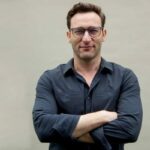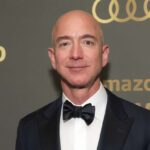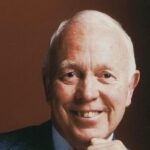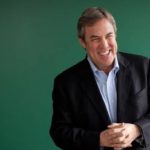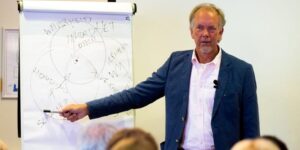Gordon Moore biography and quotes
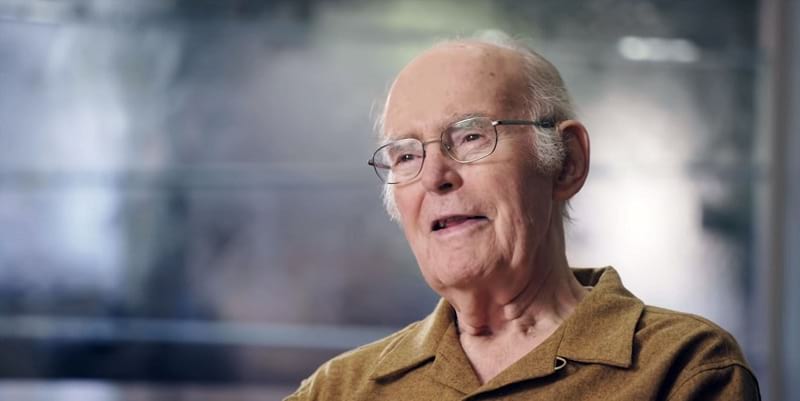
Gordon Earl Moore (San Francisco, january 3th, 1929 – Waimea (Hawaï), march 24th 2023) was an American businessman, engineer, and co-founder of Intel Corporation. He was recognized as a Fellow of the Institute of Electrical and Electronics Engineers (IEEE).
In addition to his impressive professional accomplishments, he was also a devoted family man, blessed with two sons named Kenneth and Steven, as well as four beloved grandchildren. Notably, Moore’s career reached a pivotal moment in 1975, as he assumed the role of president, marking a significant milestone in his professional journey. He is best known for Moore’s Law. This article contains his biography, quotes and publications.
Gordon Moore predicted in his article for Electronics Magazine in 1965 that the number of transistors on an integrated circuit, or computer chip, would be doubled every year, which became the famous Moore’s Law. The former Chairman and CEO of Intel died at the age of 94 in 2023.
Highlights Gordon Moore:
- CEO and co-founder of semiconductor company Intel;
- Known for Moore’s Law;
- Gordon and his wife Betty Moore’s foundation owns approximately $6 billion in assets and gives away $300 million a year;
- Recipient of several awards, including the National Medal of Technology and the Medal of Freedom, the highest civilian honor in the United States.
Gordon Moore biography
Gordon Moore was born in San Francisco, California. He grew up in nearby Pescadero, where his father was the county sheriff.
After his high school years, about which not much is known, he studied for two years at San José State University. He then transferred to the University of California, Berkeley, where he received a bachelor’s degree in chemistry in 1950.
In September of 1950, he enrolled at Caltech (California Institute of Technology). During his time here, Gordon minored in physics and received his Ph.D. in chemistry and physics in 1954. He then did postdoctoral research at the Applied Physics Laboratory of Johns Hopkins University until 1956.
Shockly Semiconductor Laboratory
After graduation, Gordon Moore joined the Applied Physics Laboratory at Johns Hopkins University in Laurel, Maryland. Here he researched physical chemistry of solid rocket propellants for the US Navy. He soon realized that the private industry was likely to be more exciting, with greater rewards for breakthroughs.
He was particularly interested in the transistor, an invention made at the time by William Shockley. He therefore returned to California in 1956 to work at Shockly Semiconductor Laboratory. The lab was researching production methods for silicon-based transistors, but due to management problems, Moore and seven others resigned, including Robert Noyce.
They joined Fairchild Camera and Instrument Corporation to form a new company, Fairchild Semiconductor Corporation of Santa Clara. With the necessary financing and investment from Fairchild, the company emerged as a major transistor manufacturer. Moore became director of research and development (R&D) in 1959, after Robert Noyce was appointed general manager.
In 1968, Robert Noyce and Gordon Moore left Fairchild Semiconductor to start their own company. With this, Intel Corporation was born. Soon Andrew Grove joined them, another Fairchild colleague. Together they form Intel.
In 1971, Intel Corporation presented the first microprocessor, which combined circuits for information storage and information processing on a silicon chip. Intel quickly became the leading producer of microprocessor chips.
Longtime Silicon Valley journalist and author, Michael S. Malone, called Gordon Moore, Robert Noyce and Andy Grove the ‘Intel Trinity’ and stated that “Gordon built Silicon Valley from the ground up. His legacy is the scientific spirit in Silicon Valley.”
Beginning in 1983, Gordon Moore served on Caltech’s board of trustees. He then served as Chairman of the Supervisory Board from 1993 to 2000. Gordon Moore and his wife donated $600 million to Caltech, the largest gift ever at the time. Gordon Moore states that he wants to do everything he can to keep Caltech at the forefront of research and technology.
The couple also donated $200 million to Caltech and the University of California to build the Thirty Meter Telescope (TMT). The TMT will have a segmented mirror of 30 meters wide and will be built in Hawaii. The mirror is three times the size of the record holder for it, the Large Binocular Telescope.
In 2000, Moore and his wife established the Gordon and Betty Moore Foundation, with a gift worth about $5 billion. They also founded the Betty Irene Moore Nursing Initiative, focused on nursing care in the San Francisco Bay Area and Sacramento. Many millions more were donated to various California institutions such as Stanford University, University of California, Santa Cruz and University of California, San Francisco.
In 2008, Gordon Moore received the prestigious IEEE Medal of Honor for his contributions to electronics. In 2009, the couple received the Andrew Carnegie Medal of Philanthropy.
After the year 2008, Gordon Moore maintained a relatively low profile in terms of public visibility. While there is limited information available on his activities during this period, it is known that he continued to be involved in philanthropic endeavors.
Gordon Moore Quotes
- “By making things smaller, everything gets better.”
- “Everything will be fine as long as you don’t give up. It will be hard in the beginning, but don’t stop.”
- “For the first 20 years, I couldn’t utter the term Moore’s Law. It was embarrassing. It wasn’t a law. Finally, I got accustomed to it, where now I could say it with a straight face.”
- “From the time I was in junior high school I decided I wanted to be a chemist. I didn’t quite know what a chemist was, but I kept it up and got my Ph.D. in physical chemistry.”
- “Have clarity in what you want. And don’t stop chasing your dream until you have accomplished it.”
- “I define myself as the accidental entrepreneur.”
- “I guess one thing I’ve learned is once you’ve made a successful prediction, avoid making another one. I’ve avoided opportunities to predict the next 10 or 50 years.”
- “I had no idea this was going to be an accurate prediction, but amazingly enough instead of 10 [years] doubling, we got nine over the 10 years, but still followed pretty well along the curve.“
- “I remember the difficulty we had in the beginning replacing magnetic cores in memories and eventually we had both cost and performance advantages. But it wasn’t at all clear in the beginning.” – Gordon Moore
- “I thank our employees for the contributions they made because really it is our employees who got us where we are today… and are going to take us where we want to go in the future.”
- “If everything you try works, you aren’t trying hard enough.”
- “If the auto industry advanced as rapidly as the semiconductor industry, a Rolls Royce would get half a million miles per gallon, and it would be cheaper to throw it away than to park it.“
- “If you’d asked me in 1980 what the big impact of microprocessors would be, I probably would have missed the PC. If you asked me in 1990 what was important, I probably would have missed the internet.”
- “In order to survive and win in the ever-changing world, keep updating yourself. Consume knowledge.”
- “Internet development is a surprise. I didn’t realize it would open up a new world of opportunities.”
- “It is extremely unlikely that anyone coming out of school with a technical degree will go into one area and stay there. Today’s students have to look forward to the excitement of probably having three or four careers.”
- “It sure is nice to be at the right place at the right time. I was very fortunate to get into the semiconductor industry in its infancy. And I had an opportunity to grow from the time where we couldn’t make a single silicon transistor to the time where we put 1.7 billion of them on one chip! It’s been a phenomenal ride… if you measure the industry in terms of the number of transistors it makes, which I like to do occasionally, there’s no industry that I can identify that is remotely comparable in how it’s expanded over that period of time. We’ve grown a lot in dollars, but we’ve grown a heck of a lot more in our output.” – Gordon Moore
- “It’s a question of keep reaching and following up the things that look like they’re really good potential.”
- “It’s amazing how creative the people have been about getting around the apparent barriers that are going to limit the rate at which the technology can expand.”
- “It’s important to certainly change. Participants in the business recognize that if they don’t move fast they fall behind technology, so essentially from being just a measure of what has happened, it’s become a driver of what is going to happen. Something I never would have imagined initially.”
- “Lack of fear of failure is an important part of it. People are willing to try things. They figure if they don’t make it, they can do something else.”
- “Make it a part of what you do, remain grounded in your work. Look for innovative solutions.”
- “Most of what I learned as an entrepreneur was by trial and error.”
- “My first job out of school was to do basic research at Johns Hopkins University’s applied physics lab.”
- “My neighbor got a chemistry set, and we could make explosives. In those days, chemistry sets had some really neat things in them, and I decided about then that I wanted to be a chemist, not knowing quite what they did, and I continued my work in a home laboratory for some period of time.”
- “One thing a leader does is to remove the stigma of mistakes.”
- “Semiconductor technology has the peculiar characteristic that the next generation always makes things higher performance and cheaper – both. So if you’re a generation behind the leading edge technology, you have both a cost disadvantage and a performance disadvantage. So it’s a very non-competitive situation. So the companies all recognize they have to stay on this curve or get a little ahead of it.”
- “That was my plan from the beginning, no you can never see that far down the road in this sort of thing. When Intel was founded the entire semiconductor business worldwide was about two billion dollars… now it’s kind of 200 billion dollars. The entire market has grown about 100 fold in that time. There was no way we could predict very far down the road what was going to happen. It was just a lucky guess, I guess on my part… lucky extrapolation.”
- “The computer is really a useful gadget for consuming time.” – Gordon Moore
- “The importance of the internet surprised me. It looked like it was going to be just another minor communications network that solved certain problems. I didn’t realize it was going to open up a whole universe of new opportunities, and it certainly has. I wish I had predicted that.”
- “The technology at the leading edge changes so rapidly that you have to keep current after you get out of school. I think probably the most important thing is having good fundamentals.”
- “With engineering, I view this year’s failure as next year’s opportunity to try it again. Failures are not something to be avoided. You want to have them happen as quickly as you can so you can make progress rapidly.“
- “Your success depends on how many times you have tried after failing. It’s all about persistence… and… keep trying.”
Books and Publications
- 2003. No exponential is forever: but” Forever” can be delayed![semiconductor industry]. In 2003 IEEE International Solid-State Circuits Conference, 2003. Digest of Technical Papers. ISSCC. (pp. 20-23). IEEE.
- 1995. Lithography and the future of Moore’s law. In Integrated Circuit Metrology, Inspection, and Process Control IX (Vol. 2439, pp. 2-17). SPIE.
- 1975. Progress in digital integrated electronics. In Electron devices meeting (Vol. 21, pp. 11-13).
- 1965. Cramming more components onto integrated circuits.
How to cite this article:
Janse, B. (2022). Gordon Moore. Retrieved [insert date] from Toolshero: https://www.toolshero.com/toolsheroes/gordon-moore-biography/
Original publication date: 12/07/2022 | Last update: 06/07/2023
Add a link to this page on your website:
<a href=”https://www.toolshero.com/toolsheroes/gordon-moore-biography/”> Toolshero: Gordon Moore</a>

